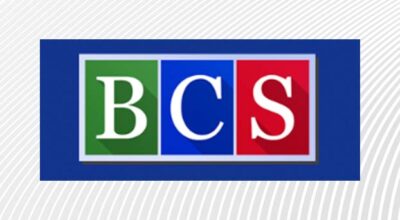TRIO program receives renewed funding
Published 6:01 pm Friday, November 25, 2016

- ACCEPTING A GRANT: SSS Director Dorothy Jordan (left) and President Barbara Tansey accept a grant from the U.S. Department of Education. They are joined by SSS participants, volunteers and staff. (Beaufort County Community College)
From Beaufort County Community College
The TRIO program at Beaufort County Community College received $339,027 through a competitive grant from the U.S. Department of Education.
The grant covers operational costs for BCCC’s TRIO Student Support Services, a national program that provides opportunities for academic development, assists students with basic college requirements and serves to motivate students to successfully complete their post-secondary education. The goal of SSS is to increase the college retention and graduation rates of its participants.
First-generation college students, low-income students and students with disabilities are eligible to participate in TRIO. Many of these students face obstacles while striving to get their education, such as having to help financially support their families while attending school, families who have little or no higher education experience, and families who may not support delaying full-time entry into the workforce.
The funding enables TRIO to serve up to 175 students. Participants receive academic tutoring, academic guidance, assistance with information on financial aid programs, resources for locating public and private scholarships, education or counseling services designed to improve financial and economic literacy and assistance with transferring and transitioning to four-year institutions. TRIO/SSS also provides individualized and group career preparation and development, cultural enrichment activities and leadership development opportunities.
TRIO operates a resource center that includes a computer lab, and makes textbooks and resource materials, digital recorders, tablets and laptops available to students.
Printing is free for participants. These are materials that participating students would not have access to otherwise, but make a difference in their chance for success. The resource center helps to foster supportive relationships among students and allows ongoing guidance from staff members.

OPPORTUNITIES: Students Stacey Godley (left) and Yasmine Davis meet scholar Angela Davis at East Carolina University.
(Beaufort County Community College)
Students receive academic coaching and learn to navigate web-based components of their classes. TRIO puts on regular workshops such as “Tech Tuesdays,” which tackles basic technological topics the students face, and “Transfer Thursdays,” which focuses on the requirements students must meet before advancing to another college. A series of workshops focuses on study skills, and there are plans to incorporate leadership skills. Participants can also access online tutoring through Upswing, a service that connects local students to tutors across the country.
Students using TRIO are more than twice as likely to remain in college as those students from similar backgrounds who did not participate in the program. TRIO serves students 938 colleges and universities nationwide.
TRIO counselors work one-on-one with each student. They are personally committed to the success of their students. Like their students, many TRIO professionals had to overcome class, social and cultural barriers to succeed in higher education. As a result, they can effectively motivate students in spite of the obstacles that often serve to discourage people from low-income families.
BCCC’s TRIO program operates against specific, measurable outcome objectives as defined in each grant proposal. TRIO program director Dorothy Jordan must meet stated objectives each year to remain funded. Students must check in with a counselor at least twice a semester. BCCC instructors complete mid-semester reports about the progress a student is making, which the counselors review with the students. They start the semester off with a session on financial literacy so students make wise choices with their financial aid. Students who have participated in a high percentage of TRIO activities throughout a semester can even apply for additional financial aid.
Over a period of several months or years, BCCC’s TRIO counselors build both personal and professional relationships with their students. They create a climate of support for students who have been held back by generational poverty.
“When I started working with TRIO, my predecessor told me that TRIO is family,”
Jordan said. “It’s a place where students can feel comfortable in the scope of the entire campus.”
The students travel together to visit other college campuses such as Elizabeth City State University or Pitt Community College where they meet other TRIO participants.
Visits to four-year universities help students make informed choices about college transfer.
This fall students attended the Greek tragedy “Medea” at East Carolina University.
Jordan described how, on their journey home, the students took it upon themselves to analyze it. They also attended a speaking event with Angela Davis at ECU and had a chance to meet the scholar and activist, as well as take pictures with her. These opportunities help excite students about learning and achieving, helping them to focus on their education and grow personally.
TRIO is research-based and has 50 years of proven results. According to Jordan, other educational institutions are now replicating its format to increase student success. With the new funding, the program can keep supporting students and helping a new generation to walk across the stage at graduation.





